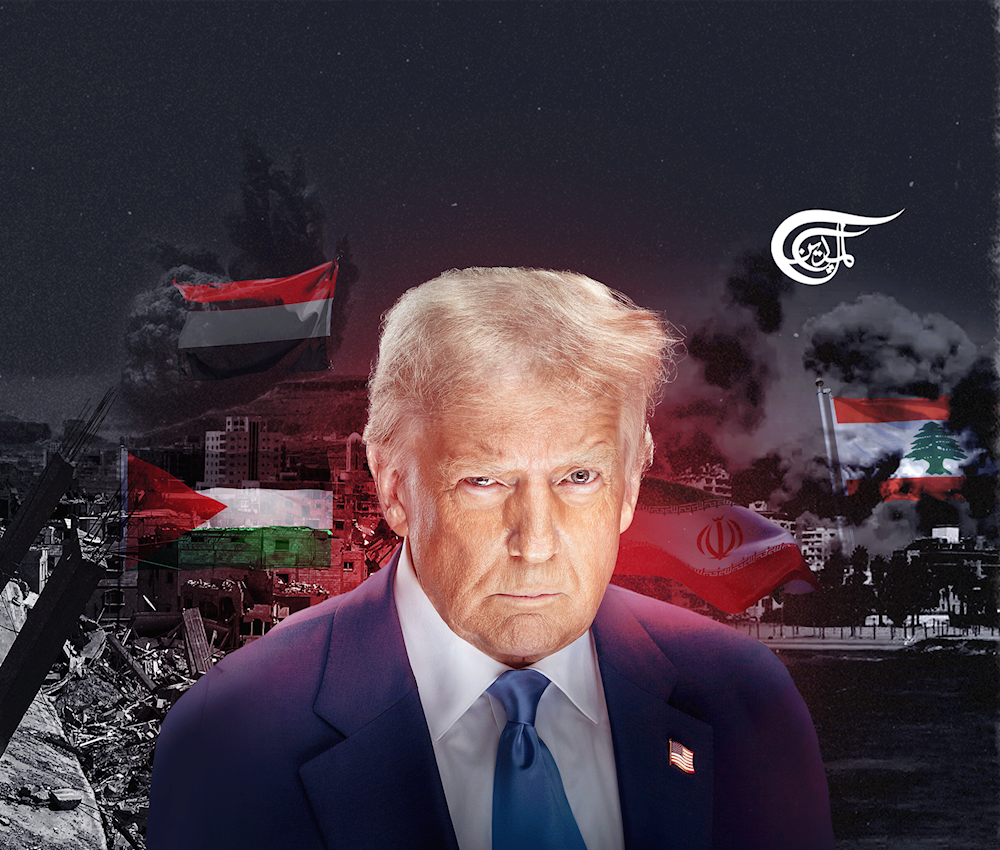What is happening in the Middle East?
The war on Gaza has resumed, US airstrikes are targeting Yemen, and renewed threats loom over Lebanon and Iraq. In each of these arenas, there are clear American and Israeli objectives.
-

All possibilities remain open, as Trump has further demands (Illustrated by Mahdi Rtail; Al Mayadeen English)
The war on Gaza has resumed, US airstrikes are targeting Yemen, and renewed threats loom over Lebanon and Iraq. In each of these arenas, there are clear American and Israeli objectives.
US President Donald Trump views all these crises as interconnected, tied in one way or another to a singular regional center of gravity: Iran.
Since he prefers achieving his goals through diplomatic and economic coercion, he sent his now-famous message to Tehran.
How will Iran respond?
Tehran has received Washington’s message. But alongside it, it has also received bloody messages on multiple fronts—messages consistent with Trump’s strategy of “maximum pressure".
The contents of the message have not been officially disclosed. Iran has chosen to withhold its response for now, studying the letter and stating that it will reply through the appropriate channels.
Yet, Trump, alongside Netanyahu, has sought to escalate pressure to its extreme limits in the region.
Trump launched heavy airstrikes on Yemen and warned that any attack from there would be blamed on Iran. In parallel, Netanyahu reactivated "Israel’s" killing machine in Gaza with full American endorsement. This was evident in Washington’s statement: “We support Israel’s next step.”
"Israel" began this next step by reneging on the commitments of its ceasefire agreement with the Palestinians.
It is not merely resuming combat—it is resuming killing—backed by US support that disregards international laws and norms.
Now, it has become easy to withdraw from agreements while they are still being implemented, only to resume military pressure on civilians in order to extract political concessions from their representatives.
What are the possible scenarios?
If Hamas and the Palestinian factions refuse to submit, Netanyahu and Trump consider that an even better outcome—for it grants them the opportunity to continue killing, displacing Gaza’s residents, and doing so without the burden of global scrutiny, UN votes, or legal discussions.
While some scholars and analysts immerse themselves in historical studies of war with utopian idealism, others execute wars without any rules or justifications.
"Israel’s" objectives seem clear:
1. Forcing Hamas to release all remaining captives unconditionally, followed by another brutal assault to crush the group.
2. Gradually escalating the war until it turns into an overt genocide—a direct, unambiguous massacre unfolding under live broadcast, without the need for accusations or evidence. Whoever still wishes to object, let them try.
Two Israeli officials told The Washington Post that the renewed airstrikes on Gaza are a political pressure tactic to force Hamas into concessions.
But Netanyahu is saying even more than that.
Netanyahu’s strategy: Negotiating through fire
Netanyahu, in full sync with Trump and his broader vision, is attempting to cement the idea that “if force doesn’t work, more force will.”
He is pushing for negotiations under fire, seeking to revise the terms of the first agreement.
It is now clear that the initial deal was merely a tactical move—to secure the maximum number of Israeli captives—before resuming the killing, thereby consolidating political gains while evading commitments.
What about the released Palestinian prisoners? "Israel" simply plans to kill them again.
This is Netanyahu’s mindset.
And to Trump, it matters little so long as interests are secured; it does not matter how many lives are lost.
What about the renewed threats against Lebanon?
The situation is undeniably dangerous. The escalation is tied to pressure on Iran and to demands for a fundamental political shift within Lebanon.
It appears that the US administration is not satisfied with what has been achieved so far. Instead, it is pushing for direct negotiations between Lebanon and "Israel"—ideally culminating in a normalization agreement.
But the realities of Lebanese society and its internal complexities make such a move unlikely.
A clear Lebanese majority opposes two things:
1. Normalization with "Israel"
2. War
This majority does not want another war. This is evident. But it also rejects normalization. So what does Lebanon want?
Most Lebanese favor a permanent ceasefire and a negotiated land demarcation agreement to recover the territory occupied by "Israel", both the pre-war disputed points and the five additional locations that have since emerged.
Despite intense media efforts to frame the situation as a push for normalization, the reality is different. The upcoming parliamentary elections will likely clarify this further.
Until then, however, US pressure will only increase—to force all parties into advancing the political process under the looming threat of renewed war.
And the risk of war grows the closer we get to a potential military strike on Iran.
Will an attack on Iran happen?
In the days leading up to now, the probability of a strike on Iran was high.
Today, that likelihood has somewhat diminished due to new developments:
• The escalation in Gaza
• The Ansar Allah strike on Nevatim Airbase
• Iran’s deliberate approach, oscillating between rejecting threats and avoiding a hasty response to Trump’s message. But something new happened in the last 48 hours: Trump and Putin spoke.
Their conversation included a key statement: “Iran must not be allowed the capability to destroy Israel,” which implicitly means preventing it from acquiring nuclear weapons.
However, another phrase stood out “U.S.-Russian geopolitical cooperation in the Middle East.”
This suggests that Russia, which has been mediating Iran’s nuclear program, may have successfully secured a reprieve from a military strike on Iran.
Yet, all possibilities remain open, as Trump has further demands.
What does Trump want?
Trump categorizes Ansar Allah, Hamas, Hezbollah, and segments of Iraqi forces as part of Iran’s regional influence.
While this is an oversimplified black-and-white perspective, it drives his policy decisions.
He appears to be demanding:
• A complete Iranian withdrawal of support for all these groups.
• Restrictions on Iran’s missile program.
• An easier US maneuvering space in the Middle East.
• And, despite it all, he still seeks tight control over Iran’s civilian nuclear program—a demand that Tehran firmly rejects.
How might events unfold?
If Iran can replicate Putin’s strategy—deflecting Trump’s anger onto his allies while keeping Washington engaged in a prolonged diplomatic process—it would mark a diplomatic masterstroke. But that is difficult.
If Russia manages to broker a middle-ground solution that stabilizes the region without fully resolving its crises, Moscow will have scored a major geopolitical breakthrough.
If Trump forces Iran into a visible retreat—at least in terms of regional influence—he will claim his victory.
But if none of these scenarios materialize, what happens next?
Then, a US-Israeli military strike on Iran becomes likely.
Not a full-scale war, but devastating hybrid attacks—combining:
• Massive strikes targeting critical infrastructure;
• Cyber warfare to paralyze state operations;
• High-profile assassinations designed to shock and destabilize Iran;
• Orchestrated protests aimed at triggering internal upheaval and regime collapse.
However, such a scenario is extremely risky for "Israel", for Trump, and for US forces in the region.
Iran has undoubtedly studied recent regional conflicts and likely has a contingency plan in place—a plan that may involve responding with an unprecedented escalation. And at that point, retaliation would likely extend to "Israel" itself.
That is the logic of war.
And war… has a way of unfolding.

 Mohamad Seifeddine
Mohamad Seifeddine
 7 Min Read
7 Min Read










